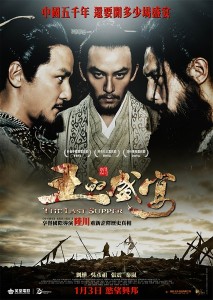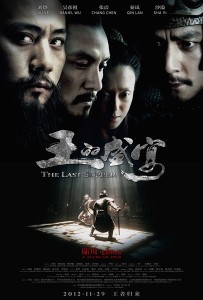The Last Supper
王的盛宴
China/Hong Kong/Taiwan, 2012, colour, 2.35:1, 115 mins.
Director: Lu Chuan 陆川.
Rating: 6/10.
Great looking but over-ambitious costume drama that fails to engage emotionally.
Chang’an, central China, 195 BC. Sick and tormented by nightmares about his past, the aged Liu Bang (Liu Ye), first emperor of the Han dynasty, lies in his palace remembering how he first met Xiang Yu, Duke of Lu (Wu Yanzu), a charismatic, noble figure fighting the oppressive Qin dynasty. In 209, Liu Bang had asked to join his forces, bringing along some of his own men; Xiang Yu gave him 5,000 soldiers so Liu Bang could retrieve his hometown of Feng, in Pei county, and rescue his wife, Lv Zhi (Qin Lan), and children. After that, Liu Bang, born into a peasant family, became known as Duke of Pei, and a trusted comrade-in-arms of Xiang Yu in fighting the Qin. Over time, however, the two became estranged, especially when Liu Bang was the first to reach the Qin heartland of the Guanzhong plain and secure the surrender of the young Ziying (Lv Yulai), last monarch of Qin, at his palace in Xianyang in late 207. Entering the palace, Liu Bang was in awe of the place and its extensive archives,  which contained detailed information on every citizen, including himself. However, he then heard from his strategist Zhang Liang (Qi Dao) that Xiang Yu, encouraged by his advisor Fan Zeng (Tao Zeru) and a defector, Cao Wushang (Xiao Tang Yuan), was on his way to Xianyang with a much more superior force of 400,000 soldiers. Xiang Yu invited Liu Bang to meet him at a banquet – the so-called Feast at Hong Gate – intending to kill him, but Liu Bang survived, partly thanks to Xiang Yu’s uncle, Xiang Bo (Li Qi), and escaped from the banquet and fled from Xianyang. In the present day, Liu Bang is tortured by the question of why one of his most brilliant generals, Han Xin (Zhang Zhen), whom he’s held in chains for the past six years from fear of his ambition, originally defected from Xiang Yu to his side back in 206, and why Han Xin was also not killed at the Feast at Hong Gate. Liu Bang’s wife Lv Zhi, now empress, poisons Liu Bang’s mind by saying that rumours are circulating that he’s dying and the much younger Han Xin has the ability to take over. She puts pressure on Zhang Liang to help her in her scheme to get rid of Han Xin.
which contained detailed information on every citizen, including himself. However, he then heard from his strategist Zhang Liang (Qi Dao) that Xiang Yu, encouraged by his advisor Fan Zeng (Tao Zeru) and a defector, Cao Wushang (Xiao Tang Yuan), was on his way to Xianyang with a much more superior force of 400,000 soldiers. Xiang Yu invited Liu Bang to meet him at a banquet – the so-called Feast at Hong Gate – intending to kill him, but Liu Bang survived, partly thanks to Xiang Yu’s uncle, Xiang Bo (Li Qi), and escaped from the banquet and fled from Xianyang. In the present day, Liu Bang is tortured by the question of why one of his most brilliant generals, Han Xin (Zhang Zhen), whom he’s held in chains for the past six years from fear of his ambition, originally defected from Xiang Yu to his side back in 206, and why Han Xin was also not killed at the Feast at Hong Gate. Liu Bang’s wife Lv Zhi, now empress, poisons Liu Bang’s mind by saying that rumours are circulating that he’s dying and the much younger Han Xin has the ability to take over. She puts pressure on Zhang Liang to help her in her scheme to get rid of Han Xin.
REVIEW
Despite impressive production values and highly realistic visual design, the artiness gets in the way of the personal drama in The Last Supper 王的盛宴. A long-gestated project by writer-director Lu Chuan 陆川 (Nanjing massacre movie City of Life and Death 南京!南京!, 2009), it’s a tenebrous costume drama about the power struggles that led to the fall of the Qin and rise of the Han dynasties at the end of the 3rd century BC. However, the famous incident referred to in the title – the Feast at Hong Gate 鸿门宴 of 206 BC, which has since entered the Chinese vernacular to mean “a treacherous invitation” – hardly features in the movie, which is more a dark psychodrama, part-Macbeth, part-King Lear, about personal betrayal, the corrupting influence of absolute power, and how the victors rewrite history. The film shuttlecocks back and forth across some 14 years as Liu Bang, the first Han dynasty emperor, lies dying in his palace.
The so-called Chu-Han Contention period, between the fall of the Qin dynasty and the start of the Han, is an immensely complex era of warring factions and, though Lu’s script simplifies it to a huge degree, he then complicates things by flashing to and fro in Liu Bang’s increasingly paranoid memory. The main characters are helpfully identified by name on screen but their alliances and intentions are rarely clarified in simple movie terms, especially for viewers without a scholastic knowledge of the period. After building up the audience’s expectations that all is to climax at the feast of the title – where Liu Bang was almost killed by his rival Xiang Yu – the film then throws the event away and veers off into a separate story about Liu Bang’s distrust of one of his own generals, Han Xin.
Though the transition is jolting, the second half is actually more involving, thanks to a terrific performance by singer-TV actress Qin Lan 秦岚 (the wife in City) as Liu Bang’s scheming, ruthless spouse. Taiwan actor Zhang Zhen 张震 is okay as Han Xin, the object of her hatred, without being especially charismatic, but he’s left in the shade by Qin and the supporting cast (such as Qi Dao 奇道, playing Liu Bang’s strategist) who are present throughout the whole film.
The Last Supper is let down by a dramatic framework that’s very unbalanced: the initial antagonism between Liu Bang and Xiang Yu is not especially gripping thanks to a shallow performance by Wu Yanzu 吴彦祖 [Daniel Wu] as the latter and, when he’s replaced as the co-lead by Zhang’s Han Xin, there’s simply no sense of dramatic continuity. Liu Bang remains the focus of the entire film; but as portrayed by Liu Ye 刘烨 (the young general in City), almost unrecognisable under hair and whiskers, he’s a fairly monotone character, swinging between awe at how he came so far from humble origins and mad rants in his dotage as an emperor.
In the masterly City, Lu managed to combine artiness and emotion to powerhouse effect; in Supper, he generates almost no feelings for the characters at all. The stage on which the story is set is undeniably dramatic, all dark courtly interiors lit by candlelight and cold, autumnal exteriors that paint an era of chaos and treachery. The considerable research that went into getting an authentic look to the era pays off on a visual level but not on any other, and there’s little help throughout from the esoteric, unearthly score by Liu Tong 刘彤 that simply underlines the general madness on screen rather than engages the viewer on an emotional level.
The era is a favourite subject for TV dramas and films, such as The Great Conqueror’s Concubine 西楚霸王 (1994) by Xian Qiran 冼杞然 [Stephen Shin] and last year’s Hong Kong/China production White Vengeance 鸿门宴传奇 (2011), directed by Li Rengang 李仁港 [Daniel Lee], which also skirted round the title feast. Despite some impressive mounting like the mechanised archive set, and some resonant performances such as Qin’s, Lu’s movie is an over-ambitious, over-intellectual exercise that too often forgets its audience.
CREDITS
Presented by Stellar Mega Films (CN), Emperor Motion Pictures (HK), Yunnan Film Group (CN), Polyface Movies (TW), Tang Dynasty Media Group (CN), Huaxia Film Distribution (CN). Produced by Beijing Chuan Films (CN).
Script: Lu Chuan. Photography: Zhang Li, Ma Cheng. Editing: Liu Yijia. Music: Liu Tong. Production design: Chen Haozhong, Lu Tianhang. Costume design: Chen Xuebing, Zhong Jiani. Sound: Wen Bo, Wang Gang. Visual effects: Yao Qi. Choreography: Zhang Jinghua, Lan Haihan.
Cast: Liu Ye (Liu Bang, Duke of Pei), Wu Yanzu [Daniel Wu] (Xiang Yu, Duke of Lu), Zhang Zhen (Han Xin, general), Qin Lan (Lv Zhi, Liu Bang’s wife), Sha Yi (Xiao He, senior minister), Nie Yuan (Xiang Zhuang, general, Xiang Yu’s younger cousin), Huo Siyan (Qi, concubine, Liu Bang’s favourite), He Dujuan (Yu, consort, Xiang Yu’s wife), Tao Zeru (Fan Zeng, Xiang Yu’s advisor), Li Qi (Xiang Bo, Xiang Yu’s uncle), Qi Dao (Zhang Liang, Liu Bang’s strategist), Lv Yulai (Ziying, last monarch of Qin), Zhao Liang (Wu She), Hao Bojie (Yu Ziqi, Consort Yu’s elder brother), Mohetaer (Fan Kuai, Liu Bang’s general), Zhao Xiang (Kuai Che), Xiao Tang Yuan (Cao Wushang), Qi Erxian (Xiahou Ying).
Premiere: Toronto Film Festival (Special Presentation), 8 Sep 2012.
Release: China, 29 Nov 2012; Hong Kong, 3 Jan 2012; Taiwan, tbc.
(Review originally published on Film Business Asia, 7 Jan 2013.)
